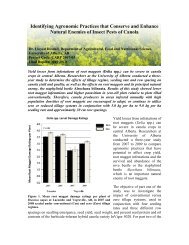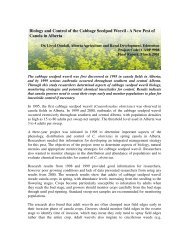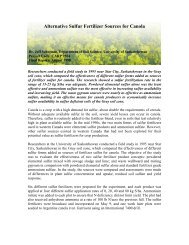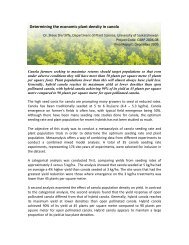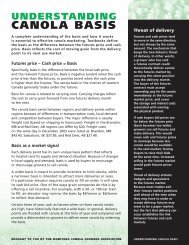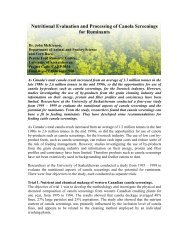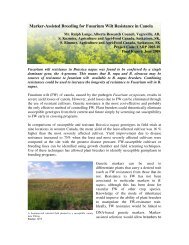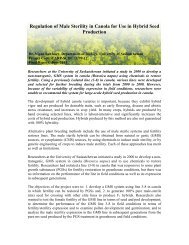Canola Digest, January 2013 - SaskCanola
Canola Digest, January 2013 - SaskCanola
Canola Digest, January 2013 - SaskCanola
You also want an ePaper? Increase the reach of your titles
YUMPU automatically turns print PDFs into web optimized ePapers that Google loves.
is available on these<br />
select canola varieties:<br />
BIOFUELS – A GROWING MARKET<br />
continued from page 31<br />
InVigor L120<br />
InVigor L130<br />
InVigor L150<br />
InVigor L154<br />
45H29 RR<br />
45H31 RR<br />
45S54 RR<br />
46S53 RR<br />
45S52 RR<br />
V12-1<br />
v1040<br />
InVigor L159<br />
InVigor 5440<br />
InVigor L156H<br />
43E02 RR<br />
43E01 RR<br />
46H75 CL<br />
45H73 CL<br />
VT 500 G VR 9560 CL<br />
VR 9559 G VR 9557 GS<br />
Red River 1861 RR<br />
®<br />
73-45 RR<br />
74-44 BL<br />
6060 RR<br />
6040 RR<br />
6050 RR<br />
Canterra 1990<br />
v1050<br />
v2045<br />
73-75 RR<br />
5525 CL<br />
5535 CL<br />
1012 RR 2012 CL<br />
Scan here for<br />
the latest information.<br />
Milligan Biofuels in Foam Lake,<br />
Saskatchewan continued its expansion<br />
and now purchases about 60,000 tonnes<br />
per year of non-food grade canola. This<br />
provides a valuable market for this seed,<br />
and the production of about 20 million<br />
litres per year of pure biodiesel. Later in<br />
<strong>2013</strong>, ADM will open its large 265 million<br />
litres per year biodiesel production plant<br />
adjacent to its current crush facility<br />
in Lloydminster. The ADM plant is<br />
expected to serve Canadian, U.S. and<br />
European markets.<br />
EUROPEAN UPDATE<br />
Although canola is not yet a large<br />
exporter to Europe, the biofuels market<br />
mandated by the EU Renewable Energy<br />
Directive (RED) appears to have significant<br />
market potential in coming years.<br />
“In some respects this market is one of<br />
the most challenging for canola,” says<br />
Patti Miller, president of the <strong>Canola</strong><br />
Council of Canada. “A key reason is<br />
that the EU has imposed sustainability<br />
criteria on all feedstocks that require<br />
audits all the way from inside the farm<br />
gate to the end user in Europe. Another<br />
reason is that EU regulators created<br />
market uncertainty in 2012 by proposing<br />
significant changes to the RED regulations<br />
which will change the competitive<br />
positioning of feedstocks.”<br />
This adds costs and complexity, and<br />
makes for an uncertain future market<br />
in the EU. The observation from the<br />
canola supply chain over the past year<br />
is that once the details for the EU market<br />
are understood, the export process is<br />
fairly straightforward. The biggest<br />
challenge is having growers ensure<br />
their agronomic and management<br />
practices meet EU requirements.<br />
Currently, Canadian exporters use<br />
the International Sustainability and<br />
Carbon Certification (ISCC) system,<br />
which enables them to export seed and<br />
oil to the EU. The good news is that<br />
audits conducted of growers under this<br />
system have resulted in all growers<br />
being certified. The less fortunate news<br />
is that these audits have also shown<br />
that record-keeping by some growers<br />
needs to be improved.<br />
View the CCC’s<br />
video on the<br />
<strong>Canola</strong> Market<br />
Access Plan.<br />
“Sustainability criteria are now coming<br />
down the track not just from Europe<br />
but also Canadian and U.S. food markets,”<br />
says Brian Chorney, a canola grower<br />
in southern Manitoba and long-time<br />
biodiesel advocate. “For those growers<br />
who follow best management practices<br />
and have implemented Environmental<br />
Farm Plans, there is little to be<br />
concerned about in terms of meeting<br />
sustainability criteria. Of concern<br />
is the potential of having multiple<br />
certification systems.”<br />
Both the domestic and foreign biofuel<br />
markets are important for several<br />
reasons. Unlike many commodity<br />
markets, the biofuels markets are based<br />
on government mandates, which means<br />
that, at least in North America, they are<br />
relatively stable. Over the longer term,<br />
there will be growing pressure to reduce<br />
carbon emissions from the transportation<br />
sector. <strong>Canola</strong>-based biodiesel<br />
has about 90 percent fewer lifecycle<br />
carbon emissions compared to fossil<br />
diesel, so this should translate into<br />
longer term, added markets for canola.<br />
The biofuels marketplace is in its infancy<br />
compared to the 100 year history of<br />
fossil fuels. Just as has been the case for<br />
the fossil oil industry, new technologies<br />
will drive change as the world moves<br />
increasingly to renewable fuels.<br />
One sector that has stepped up the<br />
pace of innovation is the aircraft and<br />
airline industry in their demonstration<br />
of renewable based jet fuel. In 2012,<br />
the German airline Lufthansa flew<br />
over 1,000 commercial flights using a<br />
50/50 blend of conventional jet fuel and<br />
bio-based jet fuel. As they say, change<br />
is in the air! •<br />
Dennis Rogoza is an advisor on<br />
sustainability issues for the <strong>Canola</strong><br />
Council of Canada.<br />
33<br />
CANOLA DIGEST JANUARY <strong>2013</strong>



